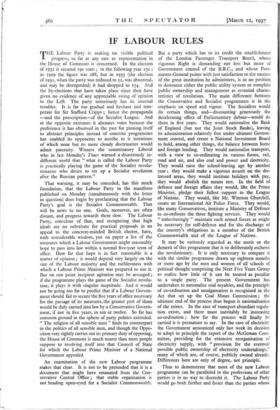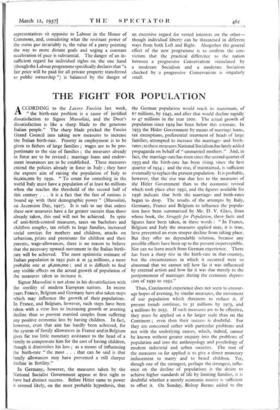IF LABOUR RULES
THE Labour Party is making no visible political progress, so far at any rate as representation in the House of Commons is concerned. In the election of 1932 it secured 191 seats ; in the following year 151 ; in 1929 the figure was 288, but in 1935 (the election of 1931, when the party was reduced to 52, was abnormal, and may be disregarded) it had dropped to 154. And the by-elections that have taken place since then have given no evidence of any appreciable swing of opinion to the Left. The party notoriously has its internal troubles. It is far too gradual and hesitant and tem- perate for Sir Stafford Cripps ; hence the propaganda —and the proscription—of the Socialist League. And at the opposite extremes it alienates votes because the preference it has observed in the past for pinning itself to abstract principles instead of concrete programmes has enabled its opponents to ascribe to it intentions of which none but its more cloudy doctrinaires would admit paternity. Witness the comminatory Liberal who in last Monday's Times warned a disastrously in- different world that " what is called the Labour Party is practically playing the game of the Socialist revolu- tionaries who desire to set up a Socialist revolution after the Russian pattern."
That warning, it may be conceded, has this much foundation, that the Labour Party in the manifesto published on Monday (simultaneously with the letter in question) does begin by proclaiming that the Labour Party's goal is the Socialist Commonwealth. That will be news to no one. Goals, moreover, are often distant, and progress towards them slow. The Labour Party, conscious of that, and recognising that high ideals are no substitute for practical proposals in an appeal to the concrete-minded British elector, have, with considerable wisdom, put on paper a list of the measures which a Labour Government might reasonably hope to pass into law within a normal five-year term of office. How far that hope is in fact reasonable is a matter of opinion ; it would depend very largely on the size of the Labour majority and the ruthlessness with which a Labour Prime Minister was prepared to use it. But on one point incipient agitation may be assuaged ; if the programme plays the game of the Socialist revolu- tion, it plays it with singular ineptitude. And it would not be going too far to predict that if a Labour Govern- ment should fail to secure the five years of office necessary for the passage of its measures, the greater part of them would be duly carried into law by a Conservative Govern- ment, if not in five years, in ten or twelve. So far has common ground in the sphere of party politics extended. " The religion of all sensible men " finds its counterpart in the politics of all sensible men, and though the Oppo- sition very rightly carries out its primary duty of opposing, the House of Commons is much nearer than most people suppose to resolving itself into that Council of State for which the Labour Prime Minister of a National Government appealed.
An examination of the new Labour programme makes that clear. It is not to be pretended that it is a document that might have emanated from the Con- servative Central Office ; that stable organisation is not heading open-eyed for a Socialist Commonwealth.
But a party which has to its credit the establishment of the London Passenger Transport Board, whose vigorous Right is demanding not less but more of Government control of the B.B.C., and whose Post- master-General points with just satisfaction to the success of the great institution he administers, is in no position to denounce either the public utility system or complete public ownership and management as essential charac- teristics of revolution. The main difference between the Conservative and Socialist programmes is in the emphasis on speed and vigour. The Socialists would do certain things, and—discounting generously the decelerating effect of Parliamentary debate—would do them in five years. They would nationalise the Bank of England (but not the Joint Stock Banks), leaving its administration relatively free under ultimate Govern- ment control, and create a National Investment Board to hold, among other things, the balance between home and foreign lending. They would nationalise transport, with a view to co-ordinating its various forms, rail, road and air, and also coal and power and electricity. They would raise the school-leaving age by another year ; they would make a vigorous assault on the dis- tressed areas, they would institute holidays with pay, they would abolish the means test. In the field of defence and foreign affairs they would, like the Prime Minister, pledge their fullest support to the League of Nations. They would, like Mr. Winston Churchill, create an International Air Police Force. They would, like many Conservatives, institute a Ministry of Defence to co-ordinate the three fighting services. They would " unhesitatingly " maintain such armed forces as might be necessary for self-defence and for the discharge of the country's obligations as a member of the British Commonwealth and of the League of Nations.
It may be variously regarded as the merit or the demerit of this programme that it so deliberately eschews the revolutionary. It is only necessary to compare it with the similar programme drawn up eighteen months or more ago by the men and women of all schools of political thought comprising the Next Five Years Group to realise how little of it can be treated as peculiar to a single party. The present Government has undertaken to .nationalise coal royalties, and the principle of co-ordination and amalgamation is recognised in the Act that set up the Coal Mines Commission ; the ultimate end of the process thus begun is nationalisation of the mines. In the case of transport abundant regula- tion exists, and there must inevitably be increasing co-ordination ; how far the process will finally be carried it is premature to say. In the case of electricity the Government announced only last week its decision to adopt in principle the report of the McGowan Com- mittee, providing for the extensive reorganisation of electricity supply, with " provision for the eventual possible public ownership of electricity undertakings," many of which are, of course, publicly not already. Differences here are only of degree, not principle.
Thus to demonstrate that most of the new Labour programme can be paralleled in the professions of other parties is in no way to discredit it. The Labour Party would, go both further and faster than the parties whose representatives sit opposite to Labour in the House of Commons, and, considering what the resistant power of the status quo invariably is, the value of a party pointing the way to more distant goals and urging a constant acceleration of pace is substantial. The danger of an in- sufficient regard for individual rights on the one hand (though the Labour programme specifically declares that "a fair price will be paid for all private property transferred to public ownership ") is balanced by the danger of an excessive regard for vested interests on the other— :though individual liberty can be threatened in different ways from both Left and Right. Altogether the general effect of the new programme is to confirm the con- viction that the practical difference to the nation between a progressive Conservatism stimulated by a moderate Socialism and a moderate Socialism checked by a progressive Conservatism is singularly small.















































 Previous page
Previous page